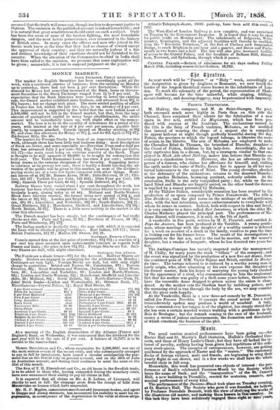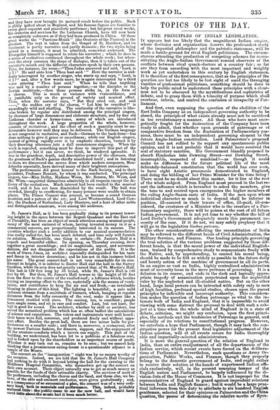The usual routine musical performances have been going on—the Exeter
Hall and St. Martin's Hall Oratorios, Mullah's Orchestral Con- certs, and those of Henry Leslie's Choir; but they have all lacked the in- terest of novelty, nothing having been given but repetitions of the orch- nary stock-pieces. The energies of entrepreneurs, however, are getting quickened by the approach of Easter and the "season." The customary flecks of foreign virtuosi, male and female, are beginning to wing their yearly flight to our shores, and in a few weeks we shall have the whole tuneful choir in full song. Meanwhile, this week has presented two objects of interest : the per- formance of Bach's celebrated Passions-Musik by the Society which bears the name of Bach; and the "inauguration" of the Et. James's Hall, a new building in Piccadilly, erected for oratorios, concerts, and musical performances of every kind. The performance of the Passions-Musik took place on Tuesday evening, at St. Martin's Hall. The Society who gave it was founded, we believe, by Professor Sterndale Bennett, with the view of studying the works of the illustrious old master, and making them known in this country. In this task they have been sedulously engaged these eight or nine yezr9, and they have now brought its matured result before the public. Each is glibly talked about in England, and his famous fugues are familiar to every good organist and pianoforte performer; but his great vocal works, his oratorios and services for the Lutheran Church, have till now been as completely unknown as if they had been produced in China. Of these great works the " Passions-Musik " (the Oratorio of the Passion) is the greatest. The text is taken from the Gospel of St. Matthew, and its treatment is partly narrative and partly dramatic; the two styles being mixed in a manner, it must be admitted, somewhat awkward. The Evangelist himself is supposed to relate his narrative ; which he does in a series of recitatives continued throughout the whole work; but when- ever the story assumes the shape of dialogue, then it is taken out of the narrator's mouth and the different characters speak in their own persons. Take, for instance, the verse—"ThenJudae answered and said, Lord, is it I ? ' He said unto him Thou hest said. ' " Here the narrator is sud- denly interrupted by another singer, who starts up and says, "Lord, is it I ?" and, after a few words more, he is again interrupted by a third voice uttering "Thou heat said." When he tells that anything was said by a number of persons together —as the disciples or the Jewish multitude,—then those persons stlike in the form of a chorus. This is much at variance with vraisemblance, and is justifiable only on the ground of variety and musical effect. Thus, when the narrator says, "But they cried out, and said " the sudden cry of the chorus, " Let him be crucified I" is exceedingly wild and startling. The continuity of the narrative is hire- wise broken by regular airs distributed among the principal singers, by choruses of large dimensions and elaborate structure, and by fine old Lutheran chorales or hymn-tunes, many of which are introduced throughout the work. A large proportion of the whole, however, consists of recitatives ; and the effect of such a quantity must be un- favourable however well they may be delivered. The German language is not congenial to recitative, and Bach—German to the back-bone—has done nothing to give it grace or smoothness; while our English singers, instead of getting rapidly over it by emphatic elocution, turned it by their drawling utterance into a dull monotonous singsong. When the work is repeated, something must be done to improve this part of the performance ; but it can never, we think, be rendered agreeable. It was in the grandeur, depth, and descriptive power of the choruses, that the greatness of Bach's genius chiefly manifested itself ; and in listening to them we discovered the source from which modern composers, Men- delssohn especially, have derived many of their brightest conceptions. The performance did great honour to the Bach Society, and to their president, Professor Bennett, by whom it was conducted. The principal singers, toe—Miss Dolby, Madame Weiss, Mr. Benson Mr. Weiss, and Mr. Winn—acquitted themselves admirably in all respects except the de- livery of the recitatives. Much interest had been excited in the musical world, and it has not been diminished by the result. The hall was crowded, literally to overflowing, for many persons Were unable to obtain places. The Prince Consort was present, as became a sound German musician and a patron of the art; and Lord Westmoreland, Lord Caw- dor, the Duchess of Sutherland, Lady Blantyre, and a host of other noble and distinguished amateurs, were among the audience.
St. James's Hall, as it has been gradually rising to its present tower- ing height in the space between the Regent Quadrant and the East end of Piccadilly, has been an object of much attention among musical people, many of the most eminent of whom having invested money in it as a commercial concern, are proportionally interested in its success. The question whether such a costly addition to our musical accommodation was really called for, has been much debated, and time only will furnish its solution. Meanwhile, one thing is certain—St. James's Hall is a superb and beautiful edifice. Its opening, on Thursday evening, drew together a great assemblage; and its magnitude, aspect, and accommo- dations, did not disappoint the expectations of the public. It is the work of Owen Jones, an architect especially distinguished for his taste and fancy in interior decoration • and he has not in this instance belied his name. The great concert-hail is not very remarkable for its size. Except in height, it is inferior to Exeter Hall and the hall in the Surrey Gardens, while its area does not greatly exceed that of St. Martin's Hall. This last is 120 feet long by 55 broad, while St. James's Hall is 140 feet by 60. But then, St. James's Hall towers to the height of 60 feet from the floor to the centre of the vaulted roof; a loftiness which, besides having an imposing effect to the eye, materially aids the means of venti- lation, and contributes to keep the air cool and fresh,—an invaluable blessing in places of this kind. The lighting is beautiful ; a pale mild radiance streams from a multitude of burners, which, hanging at regular distances from the lofty concavity of the roof, make it appear like a firmament studded with stars. The Irwin toe, is excellent; people have ample room, and sit in ease and comfort. Last, but not least, the hall is good for sound. The architect, whether by skill or accident, has solved the acoustical problem which has so often baffled the -calculations of science and experience. The voices and instruments were well heard; their tones were full, sonorous' and produced freely and without appa- rent effort. Besides the great hall, there are two minor halls for per- formances on a smaller scale ; and there is, moreover, a ratauratit, after the newest Parisian fashion for dinners, suppers, and the enjoyment of all the creature-comforts which a tavern can supply. This part of the building, we understand, has been let to a publican at a fabulous rent, and is looked upon by the shareholders as an important source of profit. Whether it may turn out so, remains to beacon; but we cannot help thinking that a promiscuous eating-house is a questionable adjunct to a teple of the Muses.
The concert on the " inauguration " night was by no means worthy of the occasion. Indeed, we are told that the St. James's Hall Company had nothing to do with it beyond letting the hall for the evening to the Middlesex Hospital Committee, who themselves got up the concert on their own account. Their object naturally was to get as much money as Possible for the funds of their estimable charity. The services of most of the performers, including the chorus and the band, and those also, we be- lieve, of the able and eminent conductor, were given gratuitously ; and, as a oonsequence of so economical a plan, the concert was of a very ordi- nary kind, both in materials and performance. This, indeed, probably Mattered little : the public came to see the new hall, and would have oared little about the music had it been much better.



























 Previous page
Previous page